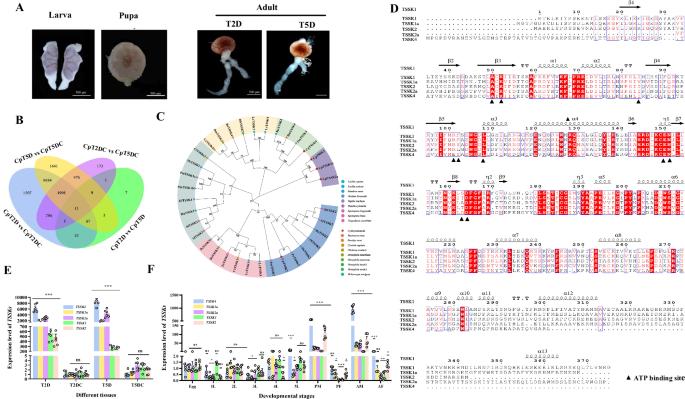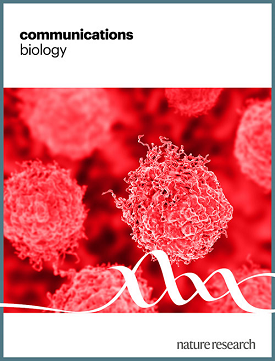Loss-of-function in testis-specific serine/threonine protein kinase triggers male infertility in an invasive moth
IF 5.2
1区 生物学
Q1 BIOLOGY
引用次数: 0
Abstract
Genetic biocontrol technologies present promising and eco-friendly strategies for the management of pest and insect-transmitted diseases. Although considerable advancements achieve in gene drive applications targeting mosquitoes, endeavors to combat agricultural pests have been somewhat restricted. Here, we identify that the testis-specific serine/threonine kinases (TSSKs) family is uniquely expressed in the testes of Cydia pomonella, a prominent global invasive species. We further generated male moths with disrupted the expression of TSSKs and those with TSSKs disrupted using RNA interference and CRISPR/Cas9 genetic editing techniques, resulting in significant disruptions in spermiogenesis, decreased sperm motility, and hindered development of eggs. Further explorations into the underlying post-transcriptional regulatory mechanisms reveales the involvement of lnc117962 as a competing endogenous RNA (ceRNA) for miR-3960, thereby regulating TSSKs. Notably, orchard trials demonstrates that the release of male strains can effectively suppress population growth. Our findings indicate that targeting TSSKs could serve as a feasible avenue for managing C. pomonella populations, offering significant insights and potential strategies for controlling invasive pests through genetic sterile insect technique (gSIT) technology. Functional analysis reveals that targeting testisspecific serine/threonine protein kinase (TSSKs) is a feasible avenue for controlling invasive pest Cydia pomonella through genetic sterile insect technique (gSIT) technology.

睾丸特异性丝氨酸/苏氨酸蛋白激酶功能缺失会导致入侵蛾雄性不育。
基因生物控制技术为控制害虫和昆虫传播的疾病提供了前景广阔、生态友好的策略。虽然在针对蚊虫的基因驱动应用方面取得了很大进展,但在防治农业害虫方面却受到了一定限制。在这里,我们发现睾丸特异性丝氨酸/苏氨酸激酶(TSSKs)家族在全球主要入侵物种--绒螯夜蛾(Cydia pomonella)的睾丸中独特表达。我们利用 RNA 干扰和 CRISPR/Cas9 基因编辑技术,进一步产生了表达 TSSKs 和表达 TSSKs 被破坏的雄蛾,结果发现它们的精子发生受到严重破坏,精子活力下降,卵子发育受阻。对潜在转录后调控机制的进一步探索显示,lnc117962作为miR-3960的竞争性内源RNA(ceRNA)参与其中,从而调控TSSKs。值得注意的是,果园试验表明,释放雄株能有效抑制种群增长。我们的研究结果表明,以 TSSKs 为靶标可以作为管理 C. pomonella 种群的可行途径,为通过昆虫遗传不育技术(gSIT)控制入侵害虫提供了重要见解和潜在策略。
本文章由计算机程序翻译,如有差异,请以英文原文为准。
求助全文
约1分钟内获得全文
求助全文
来源期刊

Communications Biology
Medicine-Medicine (miscellaneous)
CiteScore
8.60
自引率
1.70%
发文量
1233
审稿时长
13 weeks
期刊介绍:
Communications Biology is an open access journal from Nature Research publishing high-quality research, reviews and commentary in all areas of the biological sciences. Research papers published by the journal represent significant advances bringing new biological insight to a specialized area of research.
 求助内容:
求助内容: 应助结果提醒方式:
应助结果提醒方式:


